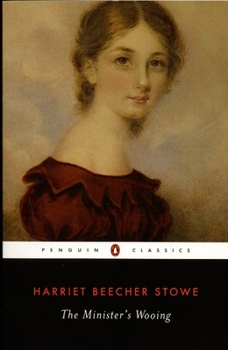The Minister's Wooing
Select Format
Select Condition 
Book Overview
From the author of Uncle Tom's Cabin , a domestic comedy that examines slavery, Protestant theology, and gender differences in early America. First published in 1859, Harriet Beecher Stowe's third novel is set in eighteenth-century Newport, Rhode Island, a community known for its engagement in both religious piety and the slave trade. Mary Scudder lives in a modest farmhouse with her widowed mother an their boarder, Samuel Hopkins, a famous Calvinist theologian who preaches against slavery. Mary is in love with the passionate James Marvyn, but Mary is devout and James is a skeptic, and Mary's mother opposes the union. James goes to sea, and when he is reportedly drowned, Mary is persuaded to become engaged to Dr. Hopkins. With colorful characters, including many based on real figures, and a plot that hinges on romance, The Minister's Wooing combines comedy with regional history to show the convergence of daily life, slavery, and religion in post-Revolutionary New England. For more than seventy years, Penguin has been the leading publisher of classic literature in the English-speaking world. With more than 1,700 titles, Penguin Classics represents a global bookshelf of the best works throughout history and across genres and disciplines. Readers trust the series to provide authoritative texts enhanced by introductions and notes by distinguished scholars and contemporary authors, as well as up-to-date translations by award-winning translators.
Format:Paperback
Language:English
ISBN:0140437029
ISBN13:9780140437027
Release Date:August 1999
Publisher:Penguin Classics
Length:384 Pages
Weight:0.62 lbs.
Dimensions:0.7" x 5.0" x 7.7"
Age Range:18 years and up
Grade Range:Postsecondary and higher
Customer Reviews
2 ratings
The Agony of Salvation and a Theology of Love
Published by Thriftbooks.com User , 21 years ago
The Minister's Wooing is the first of Harriet Beecher Stowe's three great novels of New England religion, that weave scenes and folklore of New England life with the debates and religious agonies that led her from her father's Edwardsian revivalist Calvinism to evangelical Episcopalianism. Of the three, The Minister's Wooing is the most satisfying as a story, although Oldtown Folks and Poganuc People give a fuller panorama of old New England life. (David Hackett Fischer used them extensively in his social history of the American colonies, Albion's Seed.) Mrs. Stowe improved her style greatly after Uncle Tom's Cabin which, while powerful as a moral indictment of slavery, is rather poorly written in many passages. In her New England novels, Mrs. Stowe looks back on her childhood world in Puritan New England, justifying both her desertion of some of its most tightly-held tenets and the high honor she continued to pay to its legacy. To claim that she satirizes Calvinism is a grotesque misreading, sadly typical of most introductions to her novels which desire to place her as a forbearer of secular feminism and social radicalism, rather than let her be what in fact she was, an evangelical, a Republican, and an ardent advocate of the Christianization of American society. The Minister's Wooing is set around 1798-1800 in Newport, Rhode Island, at a time just after the American Revolution. Real historical characters in the novel include Samuel Hopkins and Aaron Burr, Jr., leading pupil and grandson, respectively, of the great theologian Jonathan Edwards. While the author freely changes events in these characters' lives (Hopkins, for example, had been a foe of slavery and the slave-trade since 1776, long before the novel's time), her interpretation of these characters, both of whom she had met growing up, is insightful. Mrs. Stowe contrasts the culturally spare and logocentric world of early New England with the visual opulence which she inhabited in genteel America of the mid-nineteenth century. How to relate the insular New England Christianity of her childhood to the Christianity of Raphael, and the great cathedrals of Europe she visited as an adult? This theme is introduced both in her narrative voice (St. Augustine's Enchiridion of Faith, Love, and Hope is cited without name at the novel's turning point) and in the character of Mme de Frontignac, a French aristocratic woman in an unhappy marriage. She introduces the New England matrons to the feminine beauty of France yet finds balm for her wounds in the severe virtues of Protestant New England. Clothe the chaste Protestant New England spirit in a elegant French Catholic gentility, Mrs. Stowe seems to be saying. The theological groundwork is made more explicit in Oldtown Folks, but briefly, Mrs. Stowe believed that Jonathan Edwards, with his impossibly high standards for Christian life and his revivalist focus on a dramatic conversion experience, knocked the motherly old Puritan consensus
An underrated book by Stowe, Overshadowed by Uncle Tom
Published by Thriftbooks.com User , 23 years ago
I had to read this book for a Neglected Novels of the 19th century class. Stowe's examination into the problems of calvinism and the role of women in American society are insightful. Stowe's prose is entertianing and clear, but can be a bit droning, especially if the reader isn't acquainted with the style of 19th century novels. Overall I'd recomend this book to anyone who enjoys 19th century Lit.






